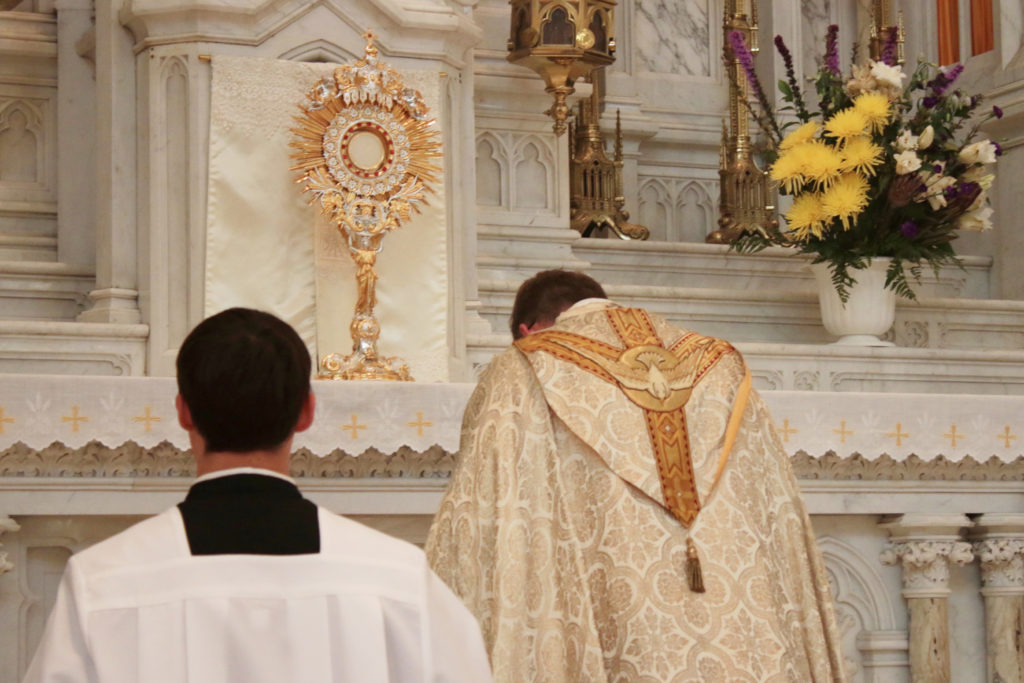When a 2019 Pew survey revealed that only 31% of Catholics believe in a basic tenet of their faith — that the Body and Blood of Christ are truly, really, and substantially present in the Eucharist — the U.S. Catholic bishops decided to take action.
At the annual meeting of the U.S. Conference of Catholic Bishops (USCCB) in 2021, the bishops called for a multi-year National Eucharistic Revival to restore and promote an understanding of and devotion to the Eucharist. The initiative will culminate in a National Eucharistic Congress in 2024, which the bishops hope will be attended by more than 80,000 Catholics.
A ‘playbook’ for Catholic leaders
As a first step, the team organizing the revival released a “playbook” to assist diocesan leaders, priests, and Catholic school administrators in coming up with plans to stoke up fervor for the Eucharist within their communities.
Bishop Andrew Cozzens of Crookston, Minnesota, chairman of the USCCB’s Committee on Evangelization and Catechesis, notes in the preface to “Leader’s Playbook: Year 1,” that the faithful are called to be “missionary disciples.”
The mission, Cozzens writes, is to “renew the Church by enkindling a living relationship with Jesus Christ in the Eucharist.”
‘It’s about a relationship with Jesus’
Having a relationship with Jesus isn’t something new, Father Craig Vasek, a priest of the Diocese of Crookston and a member of the team of priests tasked with helping ignite eucharistic faith, told CNA.
“It’s something that Jesus asked of us at the beginning. This is what he’s doing with his 12 disciples, and what he wants to show the world,” he said. “He wants to share a living relationship with us, and in no place greater than the Blessed Sacrament.”
If some are not accustomed to talking about Christ in this way, Vasek says that’s a sign that something has been missing in the way Catholics practice their faith and pass it on to others.
“This has been the cry of the Church for decades, of those who are paying attention, who say, ‘We can’t just do things and promote programs. We have to introduce people to Jesus,” Vasek said. “Pope Benedict was all about how our faith is not a number of ethical principles or something, but it is about a person. It’s about an encounter. It’s about a relationship with Jesus.”
“We all need to get on our knees and say, ‘Lord, I need your grace. I need your forgiveness, and I need your mercy so that I can become more like you, and that I might live more fully in the Holy Spirit.’ I mean, this is what we need. That’s what we’re talking about,” he said.
“So we’re recovering that basic element, we are re-proposing a living relationship with Jesus.”
Practical suggestions for parishes and schools
The playbook includes practical suggestions for fostering personal encounters with Christ in the Eucharist, including eucharistic processions, retreats on the Eucharist, and “Mercy Nights,” evenings of adoration, music, and fellowship.
One of the suggestions is for parishes to request a visit of the relics of Blessed Carlo Acutis and St. Manuel Gonzalez Garcia, special intercessors for the revival.
Vasek’s parish in Minnesota recently hosted the relics for an evening of adoration, confession, and veneration.
“A bunch of people afterwards commented that this was such a transformational night, with such a Catholic feel,” Vasek said. “It’s one thing that we were able to do that was an evening of great grace.”
The playbook’s suggestions for “reinvigorating devotion” include sharing inspiring stories about the Eucharist, such as testimonials from people in the diocese, and stories about eucharistic miracles and the transformative power of the Eucharist in the lives of saints. Promoting the practice of short visits to the Blessed Sacrament and instructing the faithful on how to make a holy hour are also recommended.
Parishes are advised to offer formation programs to teach the faithful about the Real Presence of Christ in the Eucharist, and how to “open oneself more fully to the grace of receiving Jesus in Holy Communion.”
The executive team of the National Eucharistic Revival will soon make available additional resources for Catholic leaders and all lay people at its website, www.EucharisticRevival.org. Register for the free “Heart of the Revival” newsletter to stay informed about events related to the revival and new materials for formation and inspiration.

